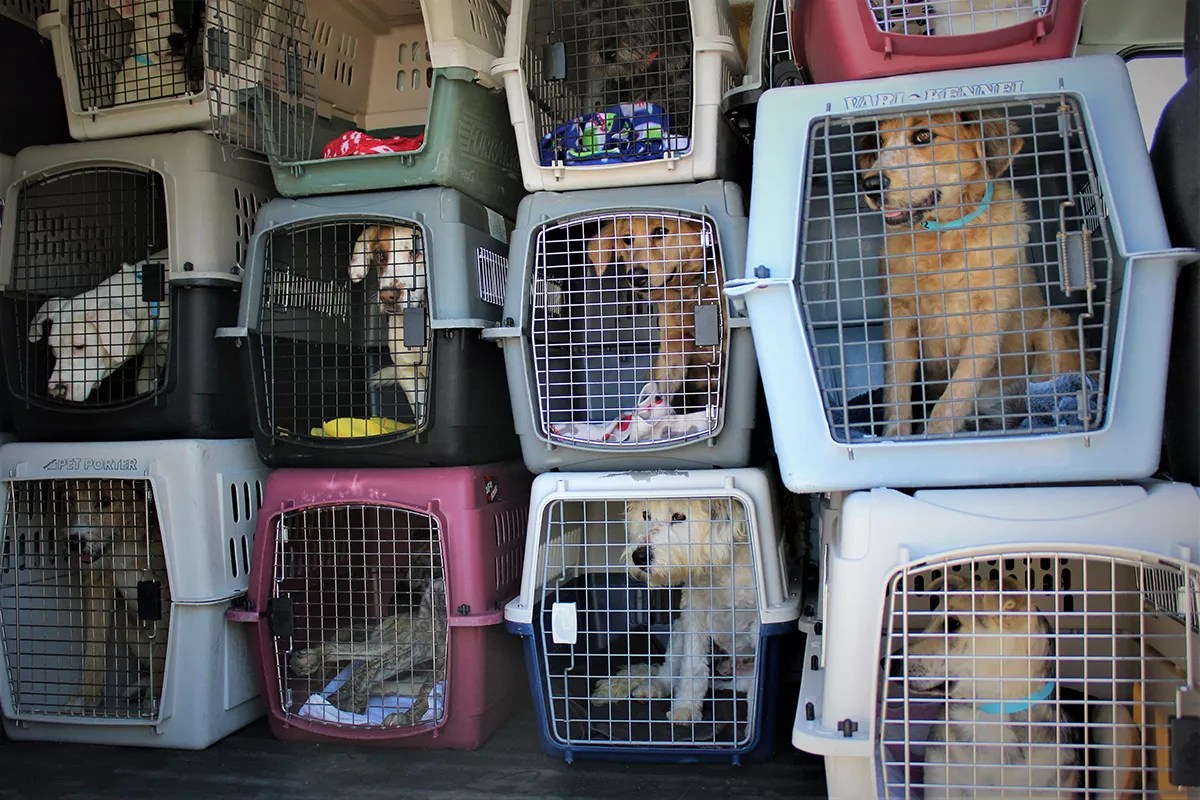
Amanda Pampuro

Audio By Carbonatix
Barbara Mumaugh emerges from underneath a tiled archway, her silver hair tied in a bun, her face wizened by the years like the rings of a tree. An unexpected visitor has arrived at her home just outside Rocky Point, Mexico, on the Gulf of California.
Unexpected to Barb, that is: The visitor, a Glendale woman named Susie LaVeer, says she emailed ahead of time. She’d been about to head back to Arizona when she saw a Facebook post asking if anybody was available to pick up a dog at Barb’s Dog Rescue and bring it back across the border to the Phoenix woman who’d adopted it. Barb’s a busy lady, though. Every day, the 67-year-old woman drops cream into her coffee at 8 a.m. and plows ahead till midnight without pause. Today, she’s got a mama dog about to go into labor and three dozen dogs that need to be sent on the road up to Phoenix. She doesn’t really do email.
Barb dispatches an assistant to find the animal, a doe-eyed dog with a perm named Zoe.
“Here’s how it’s going to work,” Barb says to Susie in an urgent, hushed tone, once Zoe has been located. “This dog is your dog now. For the full four hours it takes you to get back up to Phoenix, Zoe is yours. If they ask at the border, this is your dog, but only tell them that if they ask. Don’t say anything if they don’t.”
She sends Susie and Zoe on their way. No money changes hands.
Every few days, a bone-thin mystery mix turns up at Barb’s Dog Rescue from nearby Playa Hermosa or as far as Caborca. These dogs arrive malnourished and covered in mange. They come scarred from hot oil or with broken bones and shortened tails. Some of the dogs have been hit by cars. Some of them have been dragged by cars or tied to trees so long they have a permanent rope ring around their neck.
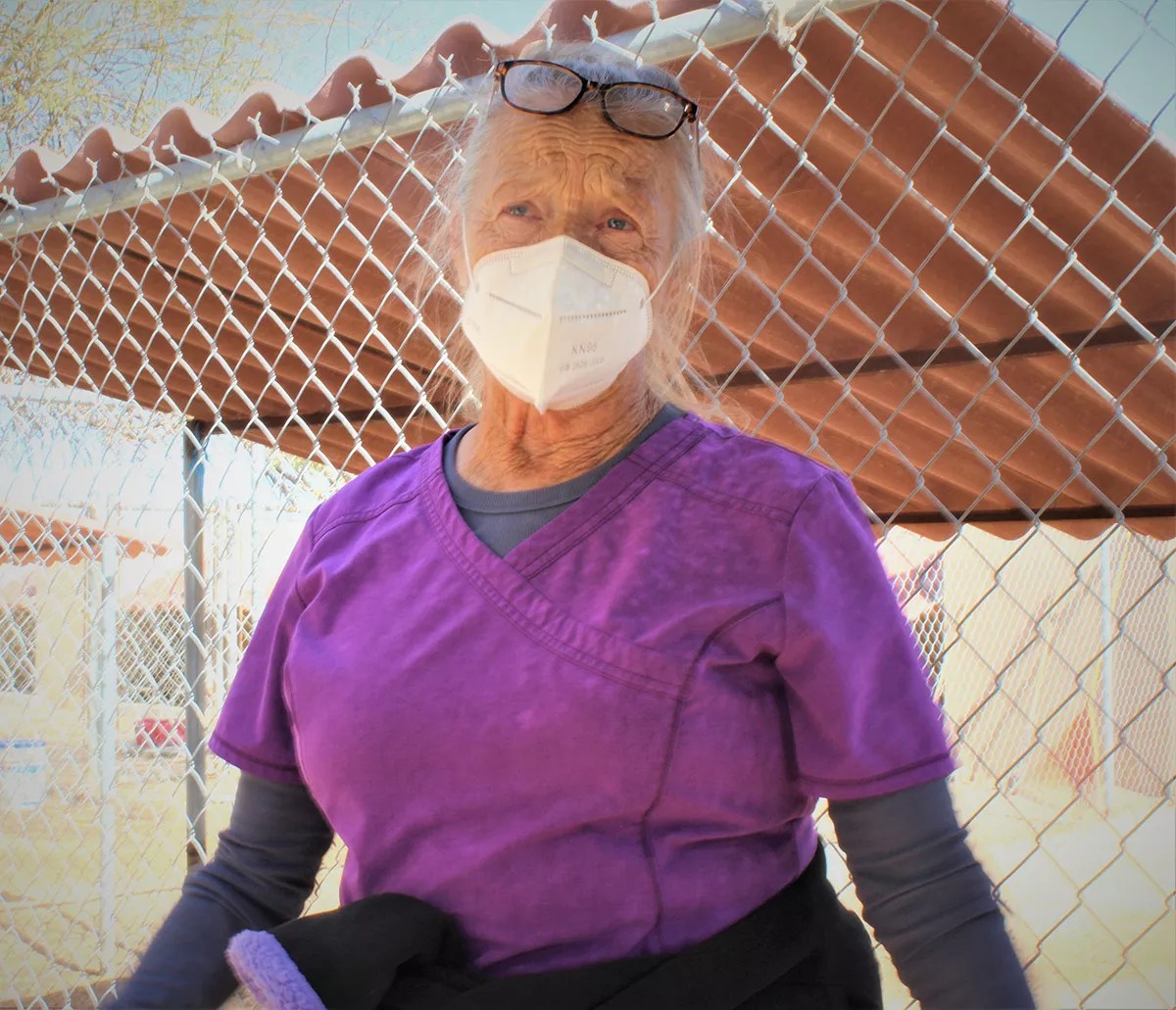
Barb Mumaugh gives a tour of Barb
Amanda Pampuro
Barb, who moved from Carefree, Arizona to Sonora 20 years ago, takes them all in – somewhere around 2,000 mutts every year. When she started out, Barb was sending a few hundred dogs like Zoe home with American vacationers every year, one at a time. But since 2017, Barb’s Dog Rescue has more than doubled its annual adoptions, sending dogs north across the border every few weeks in batches of 35. Much of that success is related to a partnership Barb forged with another impressive canine operation: HALO Animal Rescue, in Phoenix.
Scott Peterson drives three hours from Phoenix, through dust storms and speed traps, through a rolling forest of saguaro and creosote, across the U.S.-Mexico border, to a quiet truck stop in the town of Sonoyta, Sonora. He listens to hours of the Joe Rogan podcast along the way. When he pulls into town, he’s greeted by Barbara Mumaugh and a whole bunch of dogs.
Peterson, the animal resource manager at HALO, leads the dogs – timid shih tzus with fu manchus, golden fox-eared hounds – into clean, USDA-approved crates. The dogs are already tired, they are already scared, but they have no choice but to trust the hands that hold them. Peterson bids goodbye to Barb, climbs into the van, and heads back to the border, where the dogs are taxed like sneakers or fruit. Each dog’s $314 adoption fee, which covers a portion of vet care, adds up to a load valued around $10,000.
Peterson’s boss is Heather Allen, who took over HALO – it stands for Helping Animals Live On – in 2001. Her mother, Michel Herstam, founded the organization at their north Phoenix home near 24th and Shea Street in 1994. Every room in the house except the master bedroom was lined with kennels. Now retired from the Salt River Project, Herstam runs the HALO Thrift Boutique and is known for falling into sermons on sterilizing cats. If you started feeding a stray, she says, that’s only half the job.
“Barb really is a tough old bird,” says Herstam, who sees Mumaugh as a kindred spirit. “When people are in it for the right reason and just commit themselves, it’s a thing of beauty to see because nothing is too hard or too far. You just go the distance.”
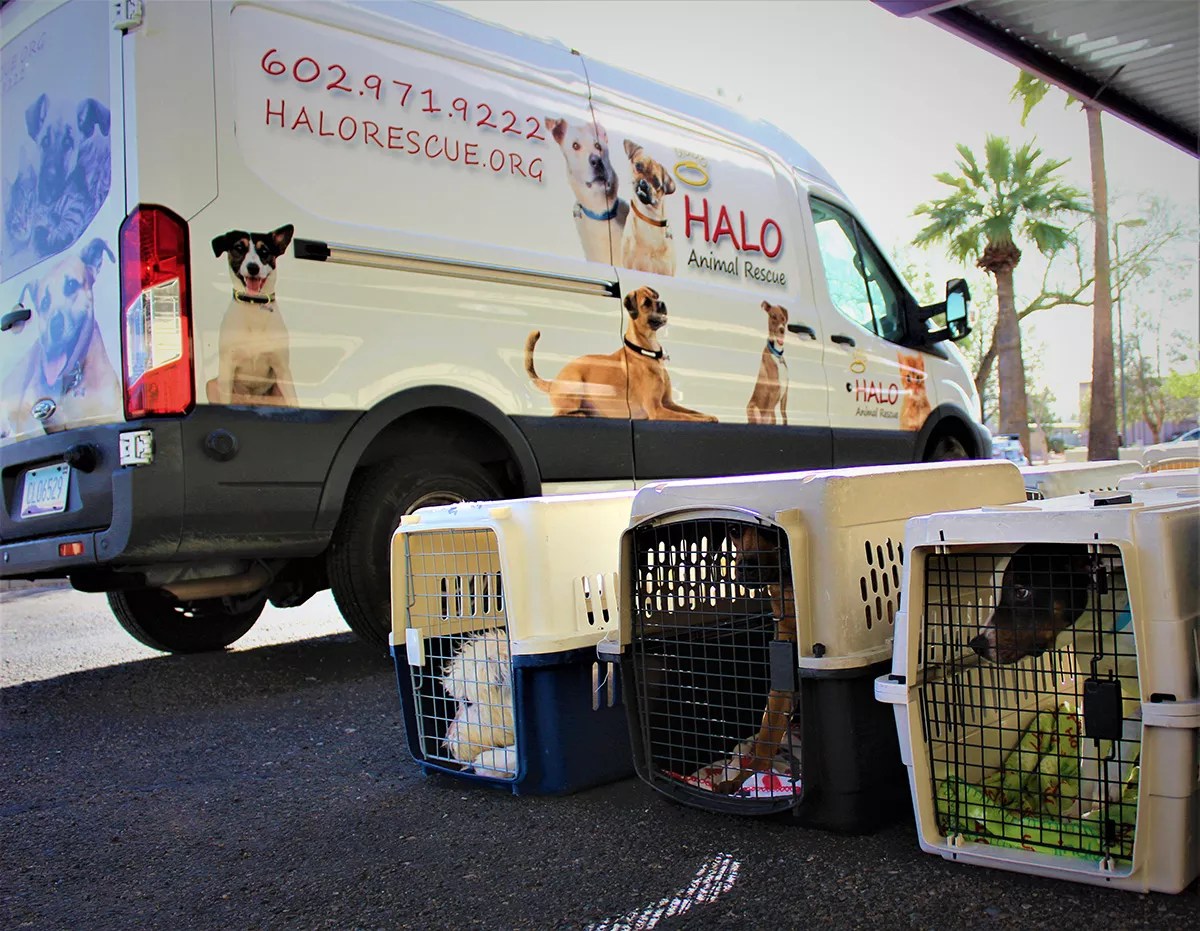
HALO
Amanda Pampuro
HALO originally operated as a foster-only model, but in 2008, the organization opened its first shelter on 35th Avenue in Phoenix and a second spot in an unused building at Maricopa County Animal Care and Control’s West facility in 2011. In 2013, HALO left 35th Avenue, bid on a request for proposal with Maricopa County, and began focusing all its efforts on helping the county pound.
“Nobody was saying, ‘How many animals are coming in and how many are being euthanized and what are they being euthanized for?'” Allen says. “If we’re euthanizing babies that are underage for adoption – less than two months of age – then let’s start foster programs. If we’re euthanizing dogs that are a little bit fearful, okay, let’s start behavior modification programs.”
By 2017, the organization had helped cut the county’s animal kill rate in half. Later that year, HALO moved into an 8,600 square-foot space on the corner of a clay-colored strip mall in north Phoenix off Bell Road. The space used to be a boarding facility, and before that, it was a pool hall where Allen once shot billiards with her friends.
Today the nonprofit generates $3 million annually and benefits from a Purina sponsorship that pays for canned food, kibble, and kitty litter. Besides the Bell Road shelter, it sends dogs to the PetSmart in Deer Valley and adopts out cats at four different Petcos. Some of the organization’s 51 employees are college students looking for flexible schedules, but many others came looking for meaningful work after commercial grinds in mortgage brokering, insurance sales, and warehouse management.
Allen met Barb in 2017. “I reached out to Barb asking if she needed help, then I went down there to meet her and pick up our first load of dogs with my mom,” Allen recalls.
On her own, Barb adopted out 700 dogs at her peak. With help from HALO and other U.S. animal rescues, Barb now adopts out more than 2,000 animals to U.S. homes.
“Our involvement with Barb’s team has literally enabled them [Barb’s Dog Rescue] to save more than two times what they were saving without us,” Allen says. “Being somebody who has visited Rocky Point, I see the level of need that’s there. I don’t want us to not be a resource for those animals.”
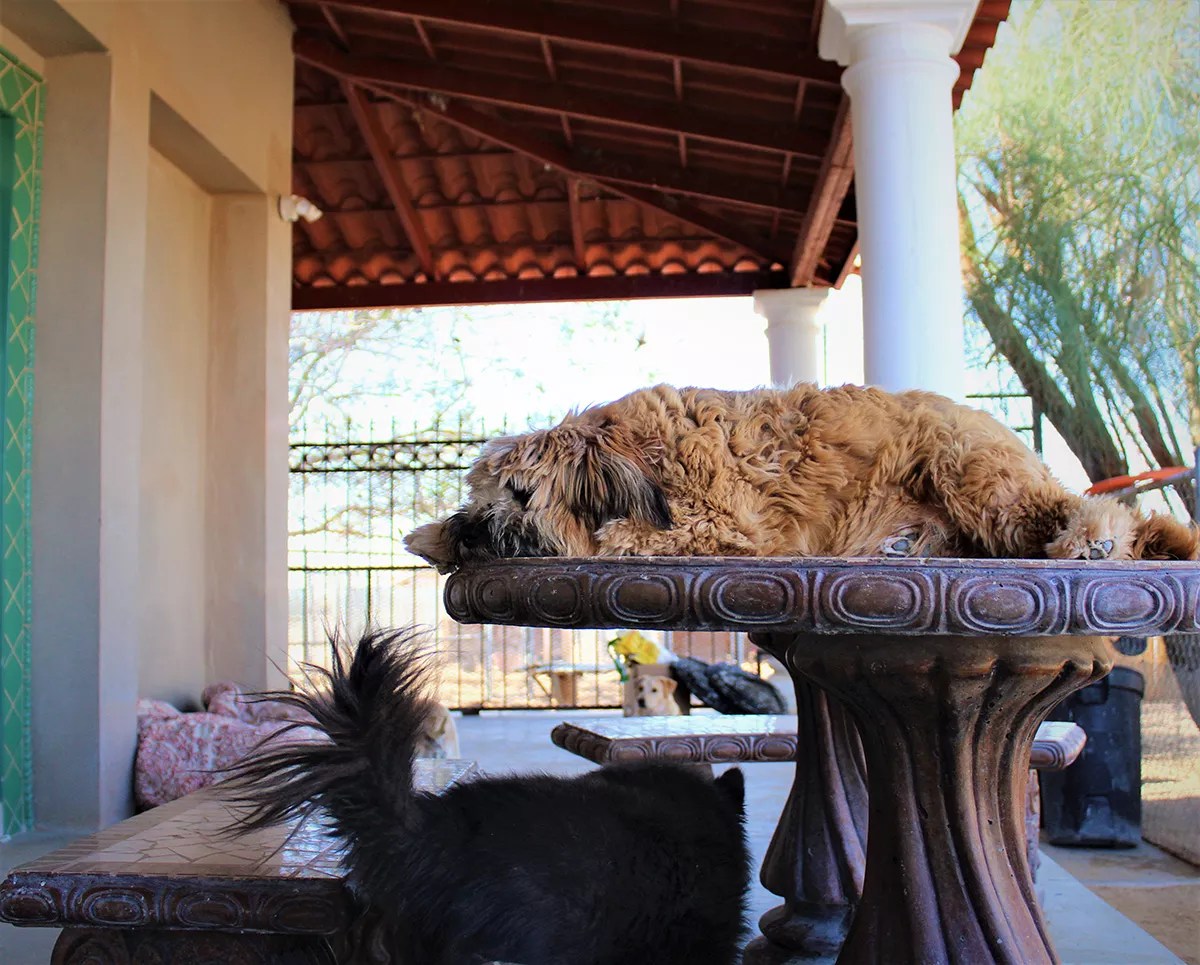
Dogs have the run of Barb
Amanda Pampuro
Back in her kitchen, Barb pats Frida, a grinning German Shepherd who drags her lame back legs behind her like extra tails. Mange-cured Carlos paces in the kennel-lined living room and a litter of Chihuahuas roll around a kiddy pool in her so-called office. Louise, Pinto, Niña, Tinker Bell: Barb seems to know the name of every dog living inside the chain-link labyrinth that encloses Barb’s Dog Rescue. She slows down only at the unmistakable thunder of a dogfight. She leaps into the commotion and claps her hands until the animals back down.
Barb was born at Fort Leonard Wood in the Missouri Ozarks, grew up in Colorado, and eventually moved to Carefree, where she was working as a real estate agent until 1999, when her daughter, Nikki, was hit by a car while crossing the road on her 21st birthday. After two years of soul-searching and grappling with her daughter’s death, Barb found herself in this beach town on the Sea of Cortez.
Something clicked. She bought a rural plot of land from a government ejido outside Rocky Point in 2001. And she started taking in dogs.
At first, just a few. Then a few more. Barb taught herself to deliver puppies, treat distemper, and set broken bones. She learned to do everything short of surgery (and she trusts only a handful of local vets to operate on her dogs). Slowly, her home became a rescue destination.
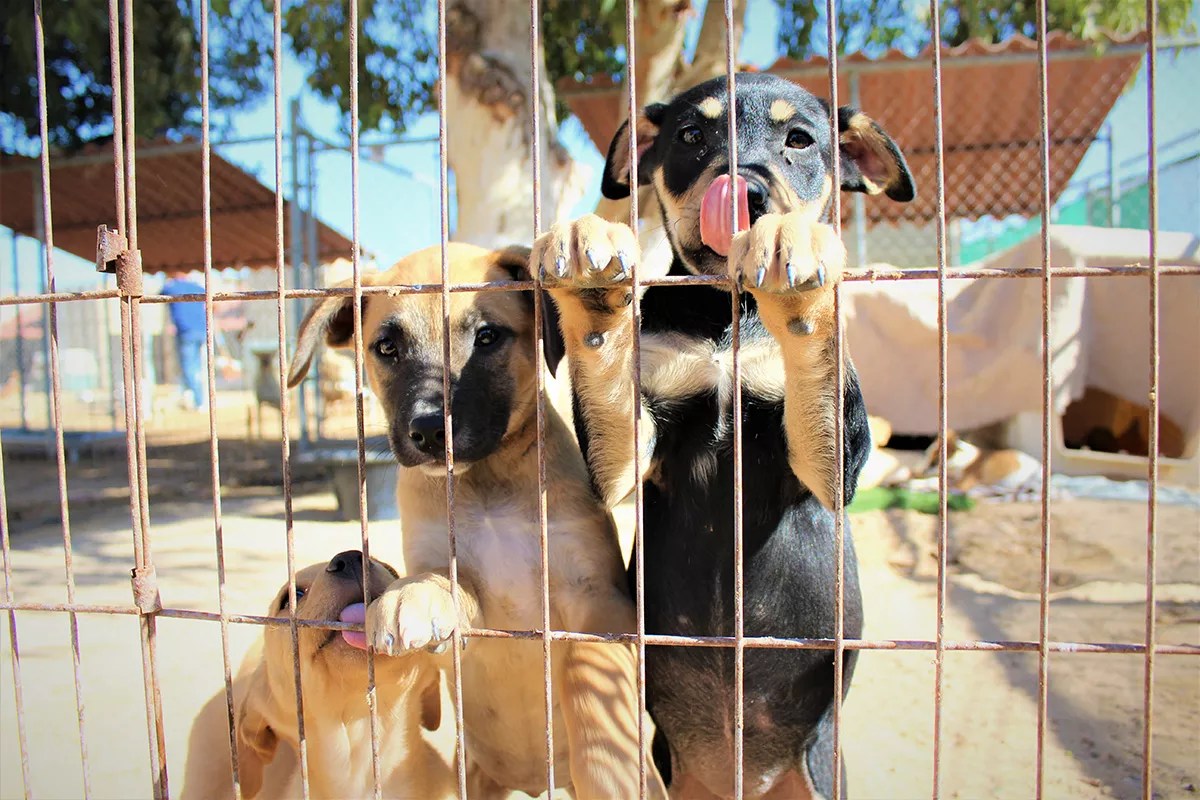
Puppies beg for attention at Barb
Amanda Pampuro
“The dogs saved me first, and now I save them,” Barb says. “Nikki, she was my life, my world, my everything.”
Today, Barb employs a dozen workers – among them, her neighbors and one deported Dreamer – that care for the estimated 300 to 350 canines on her property at any given time. Before HALO even came along, Barb managed to adopt out some 700 dogs directly to tourists, coming and going, who learned about the place through word of mouth. Vacationing retirees would visit to socialize the dogs and donate dog food. Volunteers set up the Barb’s Dog Rescue Facebook page, ran the website, and formed a board to raise money for the shelter, which is registered as a 501(c)(3) nonprofit organization in Arizona.
Every year, she takes more in – which means she needs more Americans to adopt her Mexican dogs. Hence HALO.
There is, of course, no shortage of dogs in America. But many people in Mexico cannot afford to take care of the dogs around them; they often must choose between feeding their kids and their dogs. And many Americans are heartened by the idea that they’re helping an impoverished community that struggles to feed its animals. Bringing home a mutt from another country makes for a good story, too.
“We want to help the biggest number of animals that we can help with the money and the resources that we have, and these dogs at Barb’s are just in the wrong place on the globe,” Allen says. “It doesn’t matter that they’re in Mexico, they’re closer to us than dogs in Texas.”
Even during the pandemic, demand for Barb’s dogs was high. During the summer of 2020, families on lockdown across the U.S. emptied shelters to the extent that many rescue agencies held puppy lotteries and doubled or tripled adoption fees. Though HALO did not increase fees, it operated by appointment only and adopted out most animals unseen to people who fell in love with their pictures on the Internet. But it was a different story in Mexico, where Barb continued to accumulate dogs but had fewer tourists to give them to, and a border situation that made working with HALO more difficult. At points, she was cut off from the closest town, Puerto Peñasco, which was, critically, the rescue’s main source of food. It takes 150 pounds of adult food, 80 pounds of puppy chow, and three cases of canned food to feed the menagerie each day, not to mention the chicken breast and rice that nurses the weakest dogs back to health.
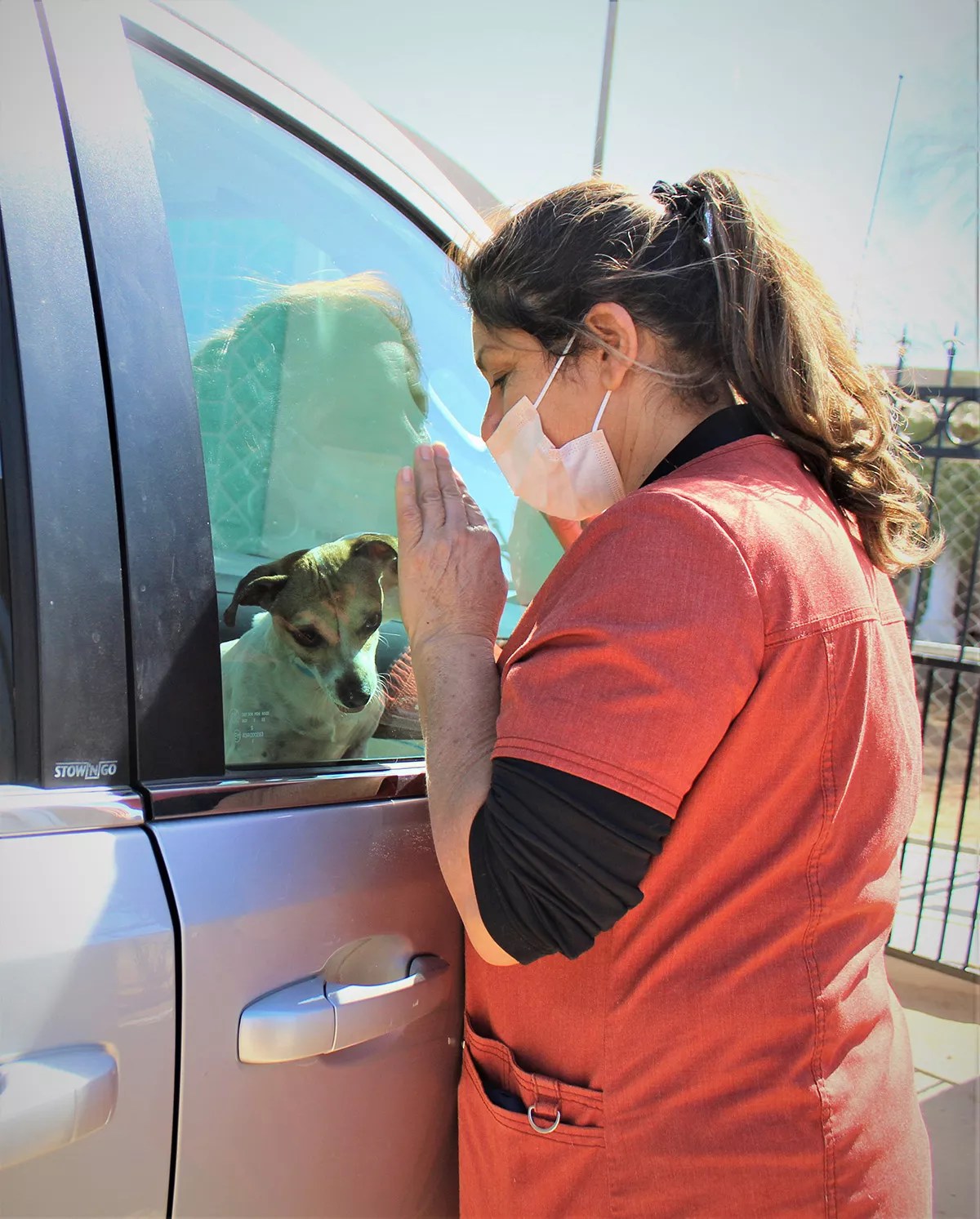
Netida Ramos kisses an Arizona-bound dog goodbye on March 3, 2021, at Barb
Amanda Pampuro
Most of Barb’s staff, including Netida Ramos, couldn’t go home after the city closed the roads due to the pandemic. They slept at the shelter. “Es como que cerrarte las puertas inmediatamente,” Ramos says, recalling the feeling of the doors closing in around her. Originally from a ranch in central Zacatecas, she has a soft spot for the small, intelegente dogs. She lived with Barb for a month before getting a permit to return home through the sanitation tunnels. Workers without proof of residency were at the shelter so long that as soon as they could, they left and never returned.
With the pandemic winding down, the Barb-to-HALO pipeline is slowly getting back to functioning the way it used to. But even then, it’s hardly a smooth process. Fifty miles of desert scrub and saguaro stretch along the ‘Hassle Free Highway’ between Barb’s and the border. Save for one gutted gas station and a few shrines to the saints, there is no sign of anyone else along the way. Barb always checks the oil before leaving.
To enter the U.S. for adoption, dogs must be at least 6 months of age and have a health certificate. Every dog is vaccinated against rabies. Each load is capped at 35 dogs. There are relatively few regulations over the importation of cats, though fewer people adopt them.
On top of Customs and Border Protection, the process is regulated by the Centers for Disease Control and Prevention, the Department of Agriculture, the Mexican government and Arizona. Allen has Port Authority on speed dial and works with a broker, but has accepted the red tape as part of doing business across the border.
“It’s really only Customs and Border Protection on the U.S. side that we’ve ever had a problem with,” Allen says. “Nobody’s asked for a bribe or anything like that, just this whole, ‘Why are you doing this? Aren’t there enough animals to save in the U.S.?'”
At Lukeville, border patrol agents have confused symptoms of car sickness for rabies. Though animal inspectors aren’t required to import dogs, agents occasionally threaten to send the van on a 100-mile detour back through Mexico to the San Luis crossing for an inspection.
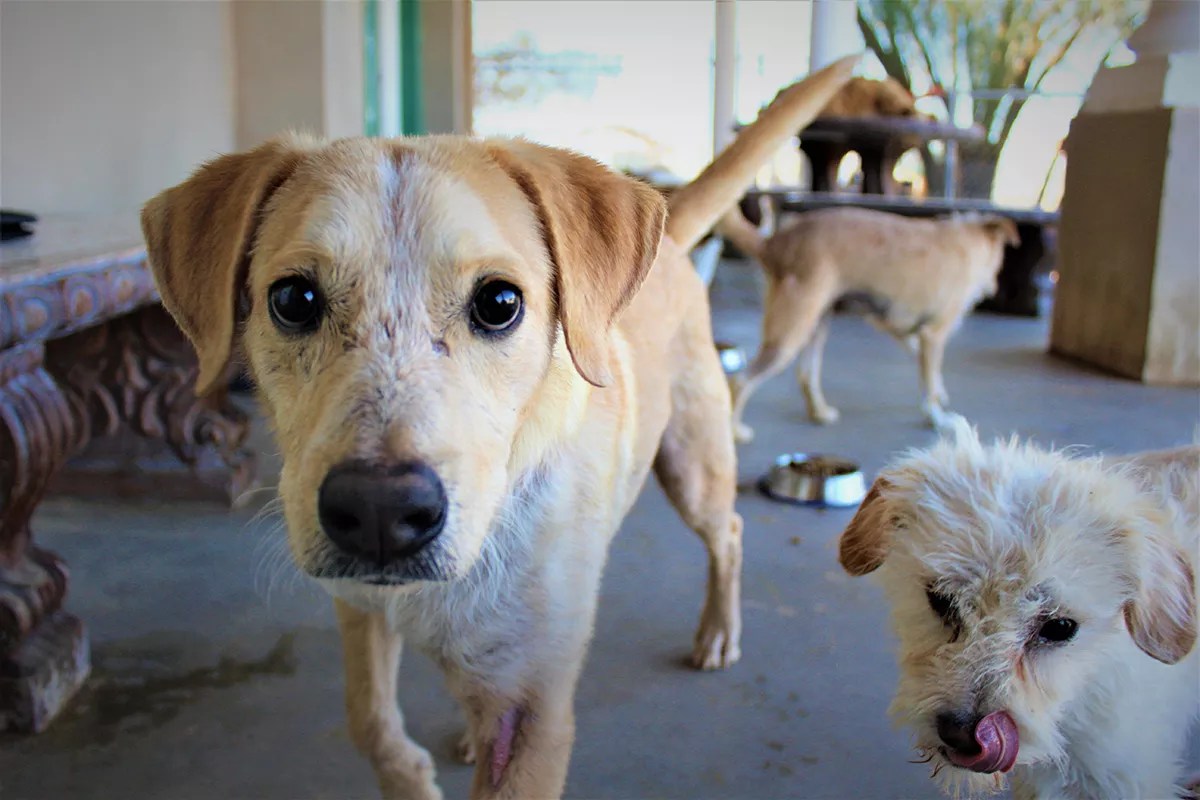
Curious dogs greet visitors at Barb
Amanda Pampuro
Every successful importation is a small victory. Every trip this scrappy rescue operation makes is a small, quiet challenge to the 30-foot rust-colored wall between the two nations. Some compare the rescue efforts to building a sand castle in the sea. Others look to the parable of the starfish: “It matters to this one.”
“It matters to these animals, it matters to their lives, and it literally makes a difference of Barb being able to save 2,000 dogs versus 750,” Allen says.
The border rigamarole in the rearview mirror, Peterson cruises toward Phoenix, Barb’s dogs barking in the back of his van. After the highway branches into four lanes and the rugged hills flatten into strip malls, Peterson pulls the van around the back of a behavioral health clinic and a crab shack. HALO employees – today, half a dozen college-aged men and women – greet the dogs like long-lost friends. They’re poked with a DAPP vaccine and led past bins overflowing with squeaky toys.
Once weighed, fed, and washed, they fall asleep on a bed of newspapers, knowing nothing of the country they came from or the one they’ve entered. But they’re lucky dogs.
“They’re going to have their own families there,” Barb had said the morning she loaded this crop of dogs into the Arizona-bound cargo van. “There is nothing better in the world than having your own family.”
This story was funded in part by the National Geographic Society.